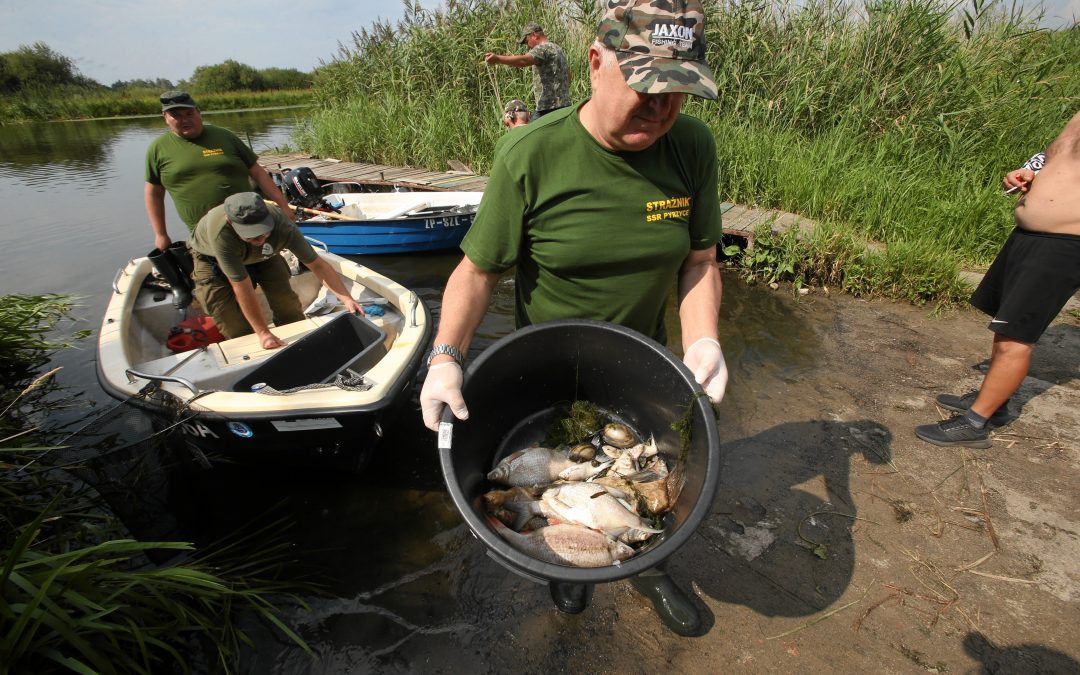Polish experts have found a toxic species of algae in the water of the Oder river, the climate and environment minister confirmed today, giving a new possible reason for the death of 100 tonnes of fish that contrasts with previous suggested explanations.
Meanwhile, a ban on using the Oder waters in any way has been extended until 25 August.
“The results of research by our experts from the Institute of Inland Fisheries have indicated the presence of micro-organisms (golden algae) in the water from the Oder river. Their bloom can cause the appearance of toxins that kill fish and mussels,” said Anna Moskwa in a tweet.
Wyniki badań naszych ekspertów z Instytutu Rybactwa Śródlądowego wskazały obecność w wodzie z Odry mikroorganizmów (złotych alg). Ich zakwit może spowodować pojawianie się toksyn zabijających ryby i małże. Nie są szkodliwe dla człowieka. Wkrótce więcej informacji.
— Anna Moskwa (@moskwa_anna) August 18, 2022
In an interview with the Polish Press Agency (PAP), Grzegorz Dietrich, director of the Inland Fisheries Institute, explained that golden algae are an invasive species that produce toxins that are harmful to fish. Earlier similar findings were announced by German researchers from the Leibniz-Institute of Freshwater Ecology and Inland Fisheries (IGB).
According to the Institute, the most common species found in the samples has been tentatively identified microscopically as Prymnesium parvum, which is known to produce and release strong toxins. It is usually only found in brackish water and depends on high levels of salinity, which do not exist naturally in the stretch of the Oder hit by the disaster.
“For the past two weeks, however, unnaturally high loads of salt have been measured at the official gauging station of the State Office for the Environment in Frankfurt an der Oder; these must have originated upstream,” said IGB scientist, Jan Köhler, an algae researcher, as quoted by the Institute.
“The mass growth of these algae also resulted in significantly elevated levels of oxygen, pH and chlorophyll being measured,” he added. Industrial discharges could have led to an effective “bioreactor for the cultivation of brackish water algae”.
Iwona Jasser, a phytoplankton specialist from the University of Warsaw, told PAP that the appearance of Prymnesium parvum and its blooms in anthropologically saline rivers and lakes around the world has been recorded since the last decades of the 20th century.
“There is a lot written on this subject in the scientific literature, but there are still a lot of unknowns regarding the factors causing the bloom and the toxicity of Prymnesium,” said Jasser. “We know that brine waters are discharged into the Oder river on a regular basis, and this creates conditions that are favourable for the growth of golden algae.”
However, she noted that the results of phytoplankton tests of the Oder river carried out in recent years are not available, making it difficult to answer the question of whether Prymnesium parvum was present earlier.
No pesticides were found in dead fish from the Oder and radioactive isotopes are below normal, says climate minister @moskwa_anna.
MPs from Poland's largest opposition party have been conducting inspections of government institutes over the poisoninghttps://t.co/CwGCqjpJcj
— Notes from Poland 🇵🇱 (@notesfrompoland) August 17, 2022
Jasser added that the algae attack the gills of the fish, leading to bleeding and suffocation. They also cause fish to lose their bearings, causing them to jump out of the water.
She added that there is a chance that golden algae are harmful to humans because they are “powerful toxins” and it is not yet known much about their effects on all organisms. She also noted that only natural methods seem viable to counteract the algae bloom.
“It is very difficult to act. We are left with natural methods [which] promote the growth of golden algae. We have to wait for nature itself to reduce the bloom and dilute the poison.”
The climate ministry says that three hypotheses which it previously mentioned as explaining what happened in the Oder river have been investigated. The first concerned toxic substances – related to industrial activity or illegal discharges to the river – entering the water.
The second potential explanation blamed natural causes – high temperature, low water level and higher pollution concentration, while the third option pointed the finger at high amounts of industrial waters – contacting chlorine – in the river.
Meanwhile the government has extended the ban on using Oder waters in any way until 25 August, informed the head of West Pomerania province, Zbigniew Bogucki. The ban includes entering the water, swimming, using it for cooking, giving it to animals, and watering plants and crops with it.
The Government Security Centre is sending alerts to residents of West Pomerania.
❗️ALERT RCB❗️
Do odbiorców na terenie części powiatu zachodniopomorskiego przesłano ALERT RCB o treści:
"Uwaga! Zakaz korzystania z wód Odry przedłużony w zachodniopomorskiem do 25.08. Nie wchodź do rzeki i nie korzystaj z niej. Nie łów ryb w rzece i nie jedz ich." pic.twitter.com/hzoeShwZxU
— Rządowe Centrum Bezpieczeństwa (@RCB_RP) August 19, 2022
Main photo credit: Cezary Aszkielowicz / Agencja Wyborcza.pl

Alicja Ptak is deputy editor-in-chief of Notes from Poland and a multimedia journalist. She has written for Clean Energy Wire and The Times, and she hosts her own podcast, The Warsaw Wire, on Poland’s economy and energy sector. She previously worked for Reuters.



















